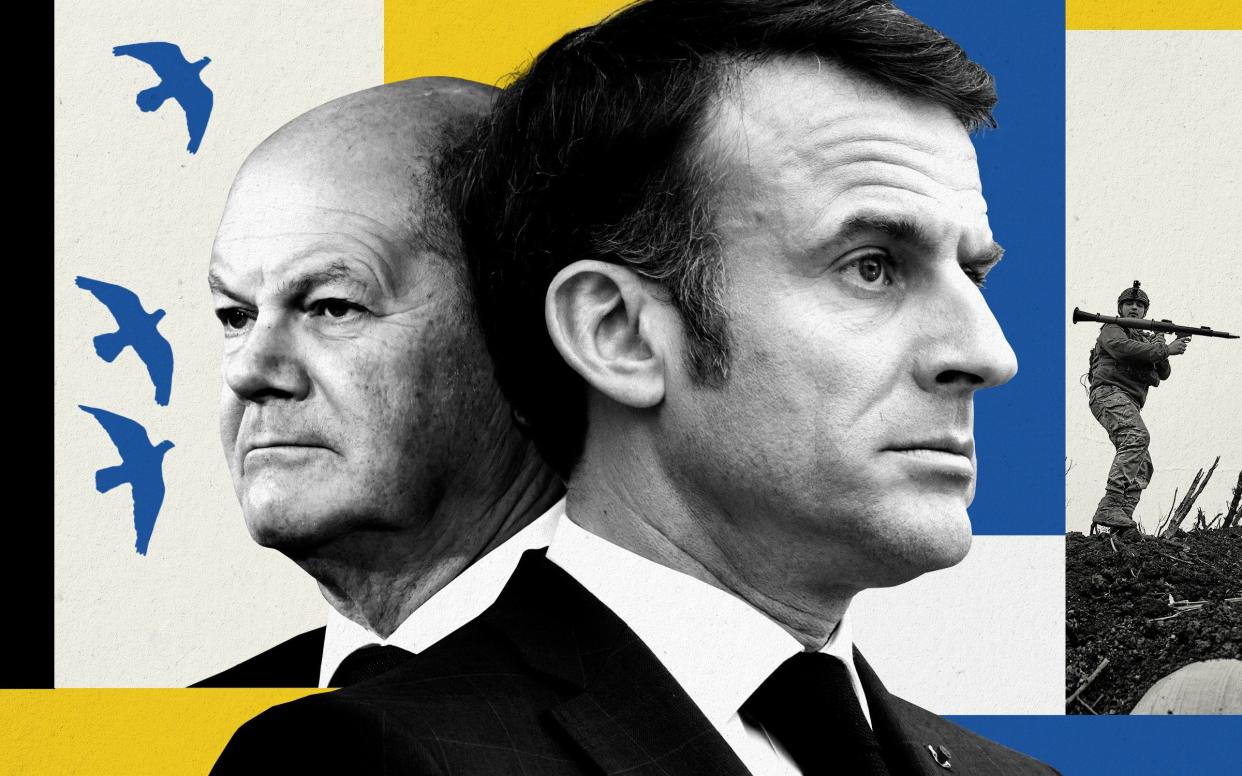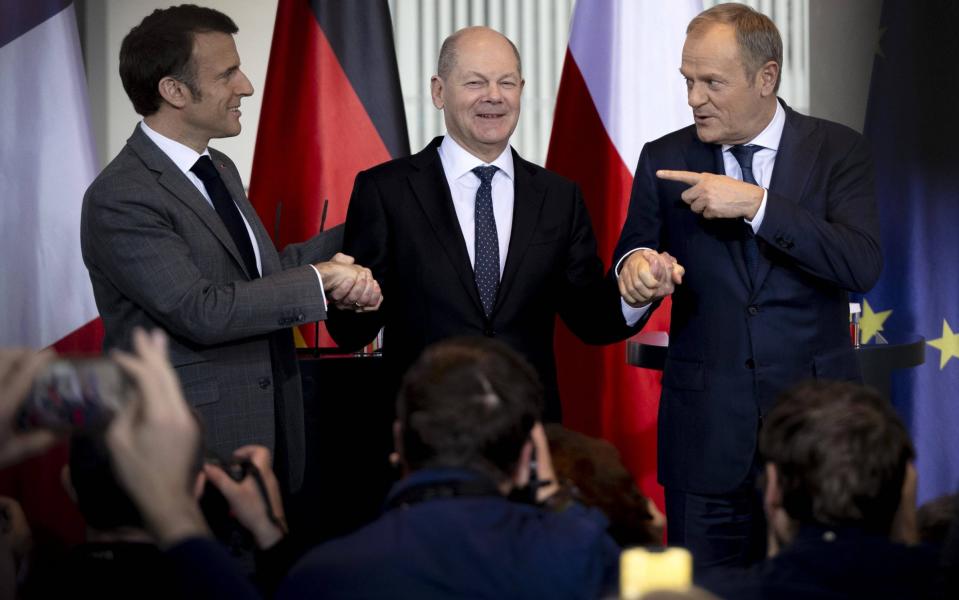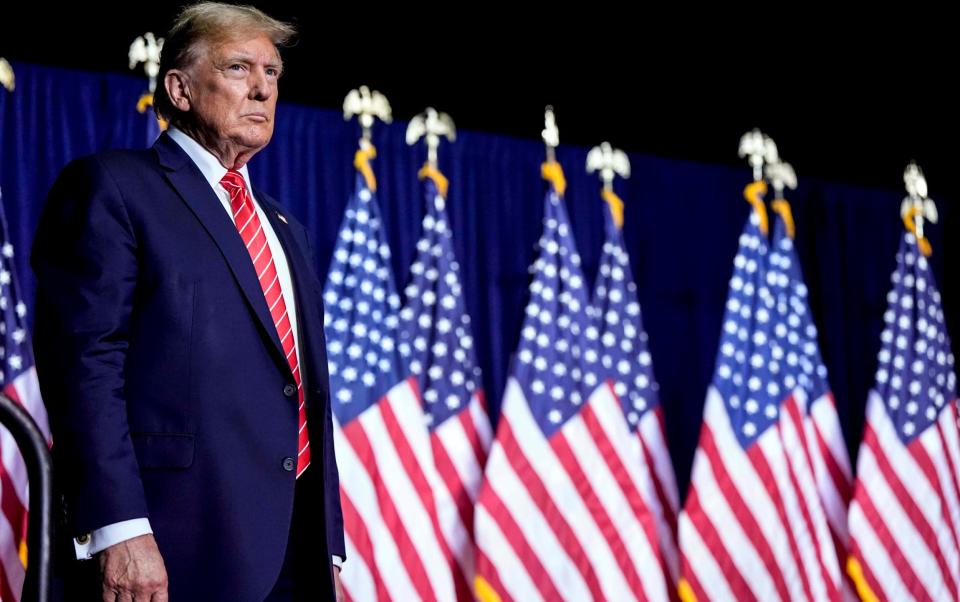The real reasons Macron turned from dove to hawk on Ukraine

- Oops!Something went wrong.Please try again later.
- Oops!Something went wrong.Please try again later.
We are “united on this day”, Emmanuel Macron said after meeting Olaf Scholz in Berlin, and “determined never to let Russia win” the war in Ukraine.
The studied show of togetherness came after months of all-too public tensions between the two leaders, epitomised by the French president apparently blindsiding the German chancellor by declaring the West had not “ruled out” putting boots on the ground.
Also present at Friday’s meeting was Donald Tusk, Poland’s prime minister. Some joked that he was there to keep the peace.
“This is a serious moment. A new era is dawning, and we’ll be there,” Mr Macron said after the three men locked hands for the cameras. “To support the Ukrainian people to the end is a strength for us, our peoples, our security and our Europe.”
Mr Macron, who has a fondness for disruptive grandstanding, is engaged in a power struggle with the more cautious Mr Scholz that is throwing a spanner in the Franco-German “engine” of European policymaking.
At the heart of the battle is the French president’s sudden transformation from Ukraine dove to hawk.

Mr Macron’s comments about the possibility of sending European troops into Ukraine at a hastily-convened Paris summit in February represented an astonishing about-turn for a president who once warned against humiliating Moscow and insisted on keeping diplomatic channels with Putin open.
To understand the reasons behind this unexpected volte-face, The Telegraph spoke to numerous sources in the Elysee and the Bundestag.
They paint a picture of a leader desperate to be seen as the dominant power in Europe amid a shifting political landscape, both internationally and at home.
Germany has repeatedly made it clear it does not think that France, the EU’s major military power, is pulling its weight on weapons supplies – a view reportedly shared by the US.
When Mr Scholz gave a speech in February urging European allies to step up their “insufficient” efforts to supply Ukraine with crucial arms, it ruffled French feathers.
Mr Macron responded by recalling Germany’s initial derisory offer of helmets to Kyiv two years ago when the Ukraine war broke out. He has also highlighted French donations of long-range Scalp missiles and urged Mr Scholz to follow suit with its Taurus missiles, considered one of the Bundeswehr’s most modern weapon systems.
The German chancellor, who has a track record of dithering over arms to Kyiv, has repeatedly refused for fear of escalating the conflict, with the Bundestag this week voting down the third proposal so far this year.
Berlin sources point out that Germany, unlike France, does not have nuclear weapons, making it more exposed to Russian retaliation.
Whenever he is challenged over Taurus, Mr Scholz brings up the fact that Germany is the second largest donor of weapons after the US.
It is true that Russia’s invasion has triggered a revolution in German defence policy. Mr Scholz announced an £85.5 billion modernisation of the long-neglected military shortly afterwards before ordering 35 American-made F-35 fighter jets worth more than €10 billion.
Germany also spearheaded a European anti-missile shield project using US and Israeli technology, which Paris has pointedly not joined. Not only have such initiatives shown France up, they have also undermined Mr Macron’s attempts for a “buy European” policy at the heart of the EU’s defence strategy.
Paris sees this as German trespassing on its turf. Berlin was breaking the gentleman’s agreement that is the bedrock of the Franco-German engine, one source close to Mr Macron said.
Simply put, Berlin takes the economic leadership in Europe, while Paris takes the strategic leadership. “The frontiers are now blurred and there are attempts to intrude into each other’s domain,” said the source.
French and German sources both admit there are differences, but deny the relationship is irretrievably broken.
As a result, Mr Macron was intent on reclaiming the European strategic leadership role on Ukraine, the source said, adding: “We are in the midst of a veritable Franco-German duel. Macron is perfectly well aware of the power struggle with Scholz.”
To retake the initiative, Mr Macron carefully planned a bombshell announcement. At a summit in Paris on supporting Kyiv, he suggested that European nations could send troops into Ukraine, saying: “There is no consensus today to send ground troops officially but ... nothing is ruled out. We will do whatever it takes to ensure that Russia cannot win this war.”
Elysee sources claim Mr Macron gave Mr Scholz two days warning of his intentions. That did not stop the exasperated chancellor feigning surprise, they said, and he wasted no time in ruling out boots on the ground in Paris before other leaders followed suit.
It was a deeply unhelpful comment for an under-pressure leader of a country with a horror of militarism, Berlin sources said.
The day after the Paris summit, Mr Scholz said the issue had been discussed, but the participants had agreed “that there will be no ground troops, no soldiers on Ukrainian soil who are sent there by European states or Nato states”. France was now “isolated”, an unimpressed German source said.
French sources insist Mr Macron knew there was no “consensus” for his latest big idea. He was certainly aware of his closest ally’s opposition to blurring the long-held Nato red line on ground troops.
But in a sign of the parlous relationship between Europe’s two most influential leaders, Mr Macron went ahead anyway.
“He has a taste for transgression,” said a French source close to the president. “There’s a price to pay for spelling out his vision, but he always hopes that the others will end up following him and that history will end up proving him right.”
Mr Macron’s jostling isn’t just about making a tilt for leadership within Europe but also to be seen as the region’s leader on Ukraine globally, particularly ahead of a US election that could see the unpredictable, Nato-baiting Donald Trump return to the White House.

In February, the Republican presidential candidate said he would let Russia do “whatever the hell it wanted” to any nation not meeting its Nato defence spending targets. Republicans have already blocked more US aid to Kyiv in Congress at Mr Trump’s urging.
Mr Macron, an ardently Europhile centrist, is devoted to the concept of building the EU’s “strategic autonomy” to ensure the bloc can punch its geopolitical weight independently of the US.
“He is saying that Europeans need to take their destiny back into their own hands, and if they need to send troops to safeguard their own destiny, they must be in a position to do so,” said a Macron insider said.
That is in stark contrast to Mr Scholz, who believes Europe should follow US leadership. He rarely misses an opportunity to highlight that Germany is the largest weapons donor to Ukraine after the US.
On Wednesday, the chancellor noted in the Bundestag that Germany had sent €7 billion in aid to Ukraine this year, compared to France’s €3 billion.
One thing both sides agree on – the continent has to at the very least match US support to Ukraine to keep much-needed finance from Washington flowing to Kyiv amid a flailing counter-offensive and growing international war-weariness.
Polls report that while most people are opposed to Putin, about 68 per cent oppose the idea of Western boots on the ground. The Ifop polling company says there is a “progressive erosion of support for the Ukrainian cause”.
This is another reason why Mr Macron decided to shake things up. France and Europe needed a “sursaut” – a mental leap from the cosy certainties of the old, dying era and into the harsh realities of the new.
French sources said the situation on the ground in Ukraine was what finally convinced Mr Macron to go public over his boots on the ground talks. Ukrainian forces are under increasing pressure in the relentless land war, with Russia making gains in the east.
Mr Macron’s Churchillian intervention was designed simultaneously to hearten the Ukrainians and stiffen European resolve. “No one can now say France is fatigued with supporting Ukraine,” one diplomatic source said.
But the French president also fears that Russia will not be satisfied by conquering Ukraine, and that Europe would be sleepwalking into catastrophe if it allows the country to lose the war.
French sources said he wanted to introduce “strategic ambiguity” into the stand-off with Russia. Far better to keep Putin guessing than let him believe Ukraine would be allowed to fall, he reasoned.
The French leader no longer trusts Putin, Volodymyr Zelensky told French TV this week, adding “It took some time, but the result is there.”
The Ukrainian president revealed he had thanked Mr Macron for his support, saying: “He understands perfectly well that defending Ukraine means defending Europe – and France. I think that’s what he arrived at. As long as Ukraine holds out, the French army can stay on French territory.”
In a live televised address this week, Mr Macron told France Ukraine had to be supported now to prevent Putin being tempted to invade EU countries bordering Russia.
German sources say Mr Macron’s new combativeness and willingness to increase weapons shipments is a sign he is finally beginning to take the war seriously.
There is another, more domestic concern that Mr Macron is trying to allay with his new stance. Marine Le Pen’s National Rally, a party with a history of admiring Putin, is on course to trounce the president’s centrists in the European Parliament election in June.
Ms Le Pen, Mr Macron’s rival in the 2022 presidential elections, hopes to use the victory as a springboard for her next tilt at the Elysee, when Mr Macron will reach his two-term limit.
Gabriel Attal, the prime minister and Mr Macron’s possible successor, recently accused the nationalist party of being Putin’s “foot soldiers” in Europe.
“Macron has long been attacked for his ambiguities towards Moscow,” the source close to the president said. “So three months before the European elections, he is offering a clear choice which is for or against Ukraine, even if it means pushing the boat out a long way.”
